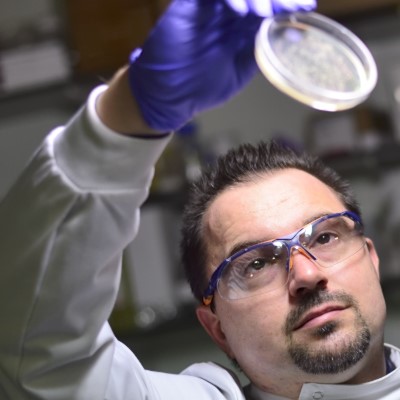Scientists have received funding to begin pre-clinical trials for a Zika virus DNA vaccine that can be manufactured within weeks and safely be deployed globally in future epidemics.
Scientists from the University of Nottingham, Nottingham Trent University, University of Leeds and the MHRA are collaborating on this project. They have received funding from the Department of Health and Social Care as part of the UK Vaccine Network (UKVN), a UK Aid programme to develop vaccines for diseases with epidemic potential in low and middle-income countries (LMICs).
Dr Dixon at the School of Pharmacy and Professor Daly (Director of the University of Nottingham's Wolfson Centre for Global Virus Research), are leading the programme, which builds on work from a previous contract.
Now, thanks to this £1.86 million funding, work can progress to test the platform in challenge models and complete pre-clinical trials. The team are working with Touchlight DNA Services Ltd, a developer of a novel synthetic DNA platform, to enable rapid scale-up and deployment of the new vaccine as a rapid response.
The advantages of DNA vaccines are that they can be produced rapidly and cheaply and do not require cold-chain storage unlike mRNA vaccines. This should make DNA vaccines ideal for responding to future disease outbreaks, especially in poorer regions of the world.
Most DNA vaccines under trial do not work well if delivered using a traditional needle and syringe and instead require an expensive device to deliver the vaccine through the skin (either by 'firing' it, using pressure with a 'gene gun', or using a mild electric shock, electroporation).
The Nottingham team have developed a solution to this problem by mixing the DNA in a special formulation so it can be given by a simple injection.
Professor Daly explains: "We have used Zika as an example disease for which there is no vaccine available yet, which is also true for the related dengue virus. Experience has shown that the usual approach of making a vaccine for Zika or Dengue may cause the body to make misdirected immune responses and lead to worse disease if a person is later exposed to a similar virus (so called antibody-dependent enhancement of disease).
"To avoid this risk, our vaccine contains a non-structural protein (NS1) instead of the envelope protein. We have optimised our vaccine and shown that mice vaccinated with it produce a strong immune response. Our aim in this project is to show we can produce the vaccine in sufficient quantity and at high levels of purity and confirm that the vaccine is able to protect laboratory animals against becoming sick when exposed to Zika virus."
The project will involve trialling the use of synthetic manufacture of the vaccine rather than the usual bacterial processes. This process can cut the time of development from 6 months to 6 weeks.

This simple injectable vaccine could be transformative when deploying vaccines in pandemics as it allows fast scale up and manufacture.
"Solving the issues that have prevented DNA vaccines from being more widely used could have a significant impact on pandemic prevention in the developing world and globally. Importantly, this approach allows a new class of DNA vaccines to be employed for many other diseases, as a rival to the new mRNA vaccine approaches."
This is a 2-year project and the team aim to take this approach to human clinical trials by 2026.






